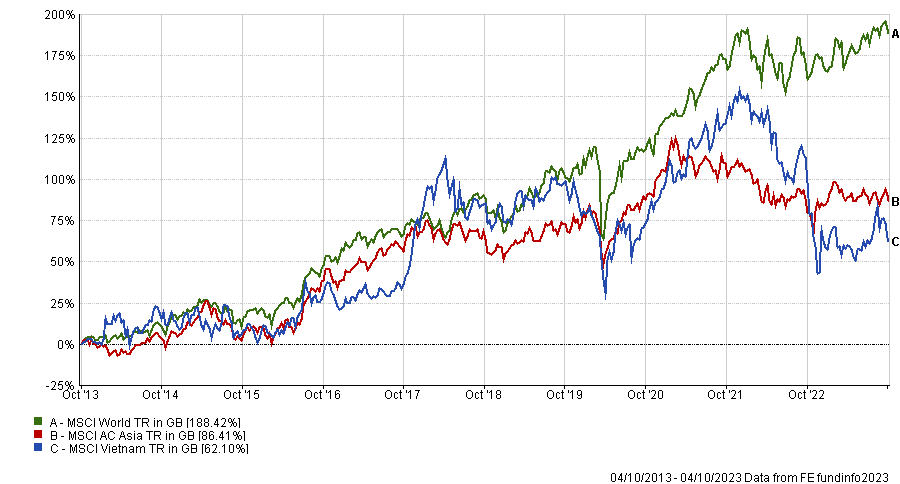Asian growth stories often revolve around the two behemoths, China and India. Yet, smaller countries in the region also have growth stories of their own.
For instance, Ewan Markson-Brown, manager of the CRUX Asia ex-Japan fund, finds the prospects of Vietnam particularly attractive.
While the allocation to the Southeast Asian country in the portfolio is small, it is an overweight relative to the benchmark of the fund of the former manager of Baillie Gifford Pacific and Pacific Horizon Trust.
Markson-Brown said: “I've been a fan of Vietnam for 10 years. It's a fast growing market, it's got a sensible government and it benefits from the ‘China plus one’ strategy.
“It has a young and highly educated population that wants to work. It's a good place to invest. I’ve got 3% of the fund in Vietnam, but I think I need more.”
As Vietnam is a volatile market, Markson-Brown said that he has to be stock and timing specific but suggested long-term investors might want to gain exposure to this market via a passive fund.
He said: “If you've got a 10-year time horizon, buy the index and close your eyes. My children's ISAs have been in Vietnam for the past six years. They will be fine in 20 years’ time.”
Apart from its young population and fast GDP growth, another tailwind for Vietnam is the geopolitical tension between the US and China.
For instance, US president Joe Biden announced during his visit to Vietnam last month that the relationship between the two countries had “entered a new stage”, after the Southeast Asian country upgraded the US to the rank of “comprehensive strategic partner” in its hierarchy of foreign relations. Therefore, Markson-Brown believes Vietnam is well positioned to become the new semiconductor hub of the US.
He said: “It takes us back to 2002 when the China bull market started after it joined the World Trade Organisation. That’s when the US started outsourcing to China.
“This is not quite of the same significance, but Vietnam might well become the semiconductor hub of the US, because the US wants to move away from Taiwan and China. Vietnam benefits from its geographical proximity.”
Performance of indices over 10yrs

Source: FE Analytics
In spite of the tailwinds of GDP growth and foreign direct investment (FDI), the Vietnamese index has underperformed both global and Asian peers over the past decade. Yet, Markson-Brown said that those factors will have a beneficial impact on the stock market over the long term.
He added: “There will be a lag but, over a decade or so, you'll find that the stock market follows GDP growth and FDI. FDI leads to manufacturing, manufacturing leads to jobs, job leads to income, which leads to new businesses.
“In the first 10 years of FDI into China, the Chinese stock market was alright, but it was just about construction, materials and commodities. It was only after that decade that you may have moved into technology and made money with Tencent and other technology companies.”
For now, the Vietnamese index is concentrated around real estate, financials and consumer staples, with the three sectors accounting for 80% of the MSCI Vietnam.
Markson-Brown finds some of the financials attractive and currently holds HD Bank, a retail and business bank. He also owns Vietnam Enterprise Investment, an investment trust, which currently has 37.5% of its portfolio allocated to banks.
Markson-Brown is, however, less enthusiastic about the opportunities in other ASEAN countries.
He said: “Thailand is an ex-growth and ageing economy with no technology and the Philippines is highly marginal. There are some interesting things in Indonesia but, while I like the commodity side, I find much better businesses in Vietnam.”
Not every manager would agree with Markson-Brown on Indonesia. For instance, Fiona Yang, manager of Invesco Asia Trust and Emily Fletcher, manager of BlackRock Frontiers recently told Trustnet that they would choose Indonesia if they could only invest in a single emerging market.





